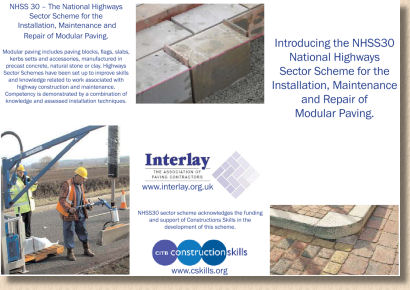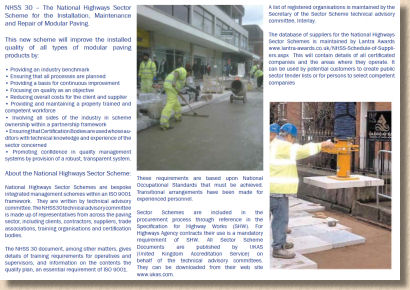NHSS 30 - for better or worse?
So: this NHSS30 mullarkey – what's it all about then and is it of any relevance whatsoever to us?
Well, the short answer is that, if you now work on streets and highways, or are planning to do so over the next 2-3 years, or if you ply your trade on the bigger, commercial jobs, then this is exceptionally relevant to you, but, if you only do patios and driveways, stop reading now and go to get a beer instead, because what follows will only make your brane ake.
The easiest way to understand all this is to separate the aims/objectives from the actual implementation. The aims are laudable; the implementation is going to be wearisome for some designers, main contractors and clients, and is quite likely to be bloody painful for contractors, who seem to be the ones burdened with all the costs and most of the paperwork
National Highways Sector Scheme 30 is intended to establish minimum standards for pavement construction. In essence, the scheme will require any operative involved in laying paving on street or highway projects to have evidence of training. In the medium term, this is expected to 'trickle down' to most commercial (non-highways) jobs. At its most basic, that training requires nothing more onerous than NVQ2 in modular paving, either the streetworks flavour or the construction skills flavour but not, apparently, the amenity horticulture flavour. No disrespect to anyone in possession of one of these NVQs, but I'm sure many of you will agree that it indicates little more than the ability to fasten one's own bootlaces and resist the temptation to fall over when not actively supported by a broom or shovel.

However, there will (eventually) be at least two training manuals/resource kits/activity colouring-in books to offer guidance on what is expected: one for flexible paving and one for rigid . Draft versions of what is currently on offer are available here and the developers would welcome feedback and constructive criticism. Bear in mind that these downloads are Course Frameworks, and not the final documents or training manuals
NHSS30 shifts responsibility for monitoring the quality of the paving away from the client and onto the poor owld paving contractor, who will effectively be required to run their business as an ISO 9001 bureaucracy to show that the work they have installed meets all the requirements of clients, designers, BS7533 , and SHW . They will police their own work and the plan is that, because they won't want to be compelled to redo or to undertake extensive remedial works, they will get it right first time. Yeah, right!
And they will have to be accredited by an independent certification body at their own expense with follow-up health-checks every 3 years or so. Naturally, no-one at the top table put a figure on the cost of the accreditation, but one contractor with experience of similar schemes reckons they'd be lucky if there was any change out of 20 grand for their business employing around 20 staff. Other sources have claimed that it is unlikely to be quite so expensive, especially if the installers already have an NVQ or are demonstrably competent and can be accredited 'en masse'. Time will tell!

The problem is that there is a huge amount of apathy and indifference amongst many of those who you would think had an interest in promoting uptake of the scheme. Some of the major manufacturers are adopting a wait-and-see strategy, while the only body showing any real support is Interlay , which with all due respect to that august organisation, does not bode well. It needs more welly than Interlay can muster if it is to be a success. One or two contractors are mildly interested, but most seem to think it is nothing but a method of shifting any responsibility away from designers, specifiers and engineers, and dumping it all on the shoulders of the poor contractor, and then requiring them to foot the bill.
As stated previously, the aims are laudable. We all want to see a professional, competent trade, but from what was discussed at the meeting in that London, this is not it. There can be no significant improvement in skills or installation standards unless there is a qualification or certification to set the benchmark. NVQ2 is completely inadequate for such aims, and with your man from CITB-Construction Skills making it crystal clear that they have neither the intention nor the desire to create a third level NVQ or higher, then all we are left with is yet another box-ticking scheme, where bureaucrats can pat each other on the back and claim to government, and anyone else who will listen, that they have magically improved the trade, while contractors are encumbered with yet more paperwork, and significant additional costs, all simply to keep hold of the work they already win!
This sector scheme will not win additional work. It is a tax on the work contractors already win.
There is an argument being made that, once the scheme is widely adopted, it will eliminate the rogues, and therefore ensure the lucrative jobs only go to accredited contractors, and the 'employers', whether they are the Highways Agency, local council, major contractor, developer or whoever, will expect to pay a small premium (the miserly sum of 1% has been mentioned) to cover the additional costs, but can then rest easy, safe in the knowledge that nothing can go wrong. Whoa! Did you see that pig fly past the window just then?
So: who is it that will get their arse kicked when telling a pushy, implacable main contractor that the paving can't be laid today because the relevant documents say the weather isn't suitable, or the base installed by another contractor is 10mm out? Sorry, but expecting a main contractor to willingly accept that work on their site won't progress as scheduled because of some sector scheme of which they have never heard is downright fanciful.

The only way to steer this lunacy towards the relative safety and calm water of common sense and well away from the rocks of bureaucratic pipe-dreams is for contractors to have their say NOW before it is too late. Once the suits have what they think is a functioning scheme, it will be implemented, whether it works or not. Implemented by bureaucrats who have no financial stake in the trade.
There are to be two guidebooks or manuals or whatever they are to be called. The draft versions of the Course Frameworks are published here . Read them. Absorb them. Then send in your feedback, comments and constructive criticism to the relevant authors. If we, as contractors, do not put in our two penn'orth now while the scheme is still in production, we cannot moan when it is imposed on us and we are suffering the consequences.
In particular, there needs to be clear advice on the availability and likelihood of grants and funding for the so-called training and accreditation, and some way of offsetting the additional admin costs that will be incurred as a result of complying with the scheme. These costs are likely to be onerous and not easily absorbed by the average single-gang paving contractor. For their own good, working contractors need to make known their thoughts on this.
As a no-longer active contractor, it's not really my place to direct opinion on the cost implications. It's better to focus on what I think I do best: ensure the training materials are at least adequate, and then to keep applying pressure for there to be a higher level of recognition for the skills employed by some of better contractors.
The only way this trade can be demonstrably and undeniably improved is by having nationally recognised and independently accredited qualifications which stretch us well beyond the derisory NVQ2. Bureaucratic box ticking will never make for a good streetmason, just a functioning administrator, and we already have plenty of administrators. What we desperately need is tried and tested paving installers, along with a clearly defined, recognised and valued career path that will attract keen new workers into the trade.
Document Downloads

Scheme Outline (58 pages!)

Lead author: John Howe
Email John - with constructive comments and suggestions for the flexible-lay training manual


Lead author: David Burton
Email David - with constructive comments and suggestions for the rigid-lay training manual

Interlay leaflet outlining the proposal
Lead author: Colin Nessfield
Email Colin - with constructive comments and suggestions regarding the scheme in general

